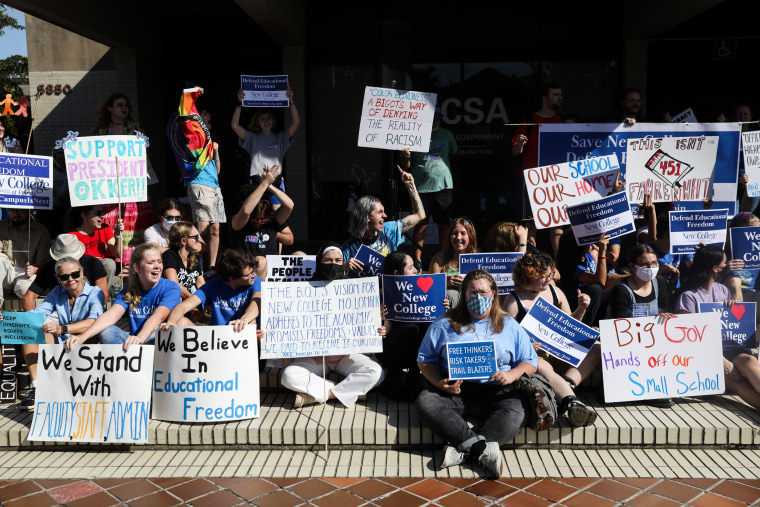States
Professors And Students At New College Of Florida Contest A New Law.

At New College Of Florida: According to WUSF, New College of Florida instructors and students are fighting a new Florida state legislation restricting “general education core courses” at public institutions. The controversial regulation, which outlaws distorting historical events, including “identity politics,” and including a curriculum based on systematic racism and oppression, has alarmed academics.
The law’s draconian penalties threaten schools’ prospects of getting tens of millions of dollars in performance-based financing. A consortium of academics, students, and NCF Freedom, Inc. has filed a lawsuit to stop higher education authorities from implementing these controversial laws.
Attorneys representing New College trustees and the state university system’s Board of Governors argued before Chief U.S. District Judge Mark Walker that the plaintiffs’ challenge was premature and lacked a legal basis because the law’s regulations had yet to be finalized. They claimed that the rule addressed school programming rather than faculty expression and didn’t prohibit optional courses.
However, Judge Walker addressed relevant issues, highlighting legal uncertainties. He questioned the difference between curriculum and perspective regulation, especially regarding historical events. He also asked about “distorting facts” and stressed the difficulty of obtaining agreement on major historical and political topics nowadays.
Note that Judge Walker earlier imposed a preliminary injunction against the conservative “Stop Wrongs To Our Kids and Employees Act” (Stop WOKE Act) in 2022, which banned higher education race-related teaching. The state will challenge Judge Walker’s ruling at the 11th U.S. Court of Appeals in January 2024.
New College Of Florida: Restrictive Law And Racism Discussions
Academics are concerned about the new Florida state legislation restricting “general education core courses” on specific themes, including racism. The ban on systemic racism and oppression courses raises problems about academic freedom to study the complicated history of US racial discrimination.
Critics say the law’s ambiguous phrasing may prevent crucial debates about the Black community’s structural issues, limiting educational institutions’ attempts to offer comprehensive and inclusive learning experiences. Additionally, the risk of losing essential funds due to legal infractions has raised concerns regarding campus diversity and racial disparity initiatives.
Racism-related Legal Challenges And Academic Freedom
During the court struggle against the restricted statute, academics, students, and NCF Freedom, Inc. have stressed the significance of academic freedom to confront racism and Black history in education. Their legal action protects academic members’ freedom to critically examine and analyze historical events, including the frequently complex and painful truths of US racial discrimination and persecution.
They emphasize the need for a learning environment that promotes open conversation and carefully examines racism’s complicated processes. Concerns about the law’s ability to eliminate course options and self-censorship have further underlined the need to maintain the educational landscape’s integrity and inclusion.
Read Also: A Fight Against The Effects Of Sugarcane Burning By Florida’s Generation Z
Court Scrutiny And Ambiguity Around Racism Discussions
Chief U.S. District Judge Mark Walker asked crucial questions regarding the law’s limits on racism and Black history talks during court hearings. Judge Walker’s investigation into “distorting facts” and the narrow line between curriculum regulation and censorship highlighted the complexity of rectifying past injustices, notably racial prejudice.
The judge’s inspection highlights the difficulties of discussing race and historical events, particularly in a social and political atmosphere where conflicting viewpoints make agreement difficult. Judge Walker’s previous engagement in comparable legal situations emphasizes the judiciary’s vital role in ensuring that educational institutions continue to encourage extensive and meaningful discussions regarding racism and its effects on the Black community.
Fighting Racism Via Educational Diversity And Inclusive Pedagogy
The legal fight has highlighted the need for educational diversity and inclusive pedagogy in combatting racism. To better comprehend systemic disparities’ historical antecedents, educators and researchers stress the necessity of including varied viewpoints and experiences in the curriculum. Institutions may foster a more inclusive learning environment that encourages students to critically examine racial prejudice and its lasting effects on the Black community by supporting multidimensional teaching.
A curriculum that represents the range of experiences and voices is also essential for fostering empathy, understanding, and social awareness in pupils. Diverse narratives and opinions in education may challenge preconceptions and deepen knowledge of underrepresented cultures, particularly Black people.
Social Reckoning And Education’s Role In Fighting Racism
The judicial struggle against educational limits on addressing racism reflects society’s dealing with the US’s racial inequities. Educational institutions help the country address systematic racism by fostering meaningful discussion and comprehending the historical settings that have perpetuated racial inequities and inequality.
Education’s role in social change is stressed by many proponents, who emphasize the need to prepare students with the skills and information to assess and resist oppressive structures critically. Educational institutions can create a generation of empathetic, socially conscious people who want to break down systemic barriers and promote a more equitable and just society by encouraging a comprehensive examination of the historical, social, and political factors that cause racial injustices.
Education Racism Controversy And Constructive Discourse
The Florida state law’s lengthy judicial struggle has spurred a more extensive discussion about handling controversy and dialogue about racism in schools. As educational institutions struggle to balance academic freedom with legal restraints, clear standards that enable courteous and constructive conversations on controversial themes are becoming more critical.
Despite the polarization of race discussions, many researchers stress the necessity of a supportive and inclusive learning environment that encourages respectful interaction and critical thought. Please encourage students to face complex realities and participate in meaningful discourse to understand racial dynamics better and empower them to promote social justice and equality. Students may also use critical thinking and empathy to resolve controversial situations with compassion and understanding, promoting a culture of mutual respect and constructive involvement in the academic community.













You must be logged in to post a comment Login